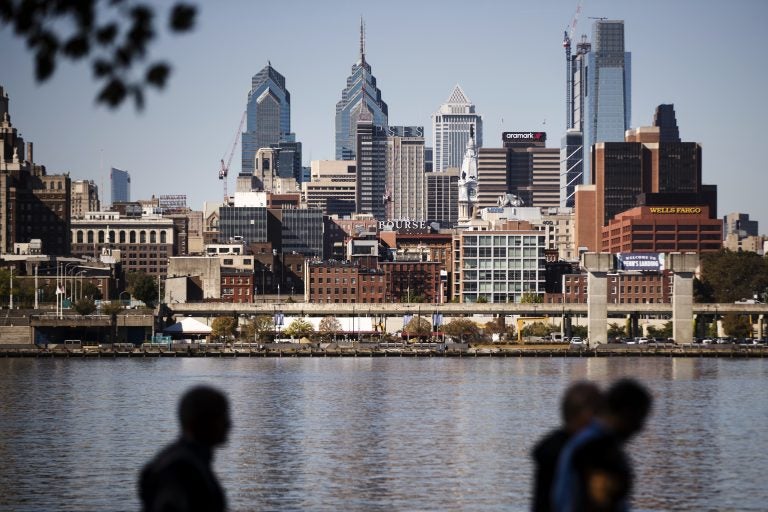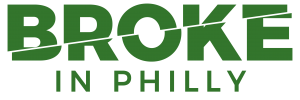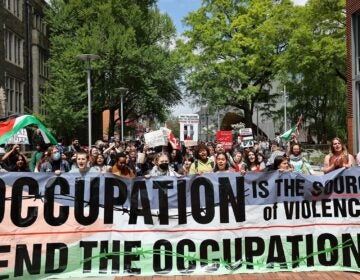Comcast’s $10 internet for low-income Americans is exploding in popularity
Nearly 200,000 Philadelphians take advantage of Internet Essentials, along with six million users nationwide.
Listen 5:59
The Philadelphia skyline is seen along the banks of the Delaware River, Wednesday, Oct. 18, 2017. (Matt Rourke/AP Photo)
Last year, the United Nations declared the internet a basic human right. Internet is also basically a requirement to participate in modern society. But for many Americans, it’s just not affordable — getting internet at home would mean another monthly bill they couldn’t pay.
That explains the exploding popularity of a Comcast program called Internet Essentials.
The Philly-based cable giant announced Monday that over the past year, its initiative had surged from four million to six million people connected nationwide.
Those numbers include nearly 200,000 low-income Philadelphians. By enrolling in the seven-year-old program, these residents scored a massive discount — they pay just $10 per month for regular internet service. That’s the same price tag as when the program first started back in 2011.
Handing out some @comcast Internet Essentials materials at my first Philadelphia Middle School Board of Directors Meeting #digitaldivide pic.twitter.com/dpaGChVf6x
— Isaiah Marcus J (@IsaiahMarcusJ) October 12, 2016
The program, which Comcast says is the company’s “No. 1 community impact initiative,” targets people who are experiencing economic hardship, providing cheap internet service every month as long as you meet the qualifications. You’re eligible for the program if you:
- Have at least one child who qualifies for the National School Lunch Program
- Receive HUD housing assistance (this includes the Philadelphia Housing Authority)
- Live with a veteran receiving state and/or federal assistance
Additionally, you must:
- Not have outstanding debt to Comcast that is less than a year old (if your debt is more than a year old, you may still be eligible)
- Live in an area where Comcast Internet service is available but have not subscribed to it within the last 90 days
In some parts of the country, there are pilot programs that extend the service to people who:
- Enroll in a two-year community college and receive a Pell Grant OR
- Are age 62 or older and receive public assistance
In Philadelphia, Comcast’s home city, the program is open to all low-income residents, and the 90-day embargo does not apply.
Alexis Floan signed up for the program from her West Philly home about four months ago. She’s 19 years old, and lives with her mother. She currently works two part-time jobs — one at the Children’s Place, and one at Chick-Fil-A.
If you’re a community college student living in public housing and in need of internet or a better option money wise for internet, look into Internet Essentials by Comcast. $9.95/mo.
— ✨FatBellyKi. (@TheAlexisK) August 1, 2018
Floan had trouble making ends meet, but she couldn’t go without internet — she’s a student at Delaware County Community College, and she needed it to finish her schoolwork.
In the past few months, the reduced bill has lifted a weight off their shoulders.
“It’s definitely much better,” Floan said. “Everybody should try it and see if they qualify, because it is a great help.”
Floan is one of many Philadelphians who recently signed up for the program — the city’s enrollment in the program increased by 63 percent in the last year.
This is especially notable because the last time Philly tried something like this, it was a major failure.
Making up for ‘brotherly love lost’
Nearly 15 years ago, under former Mayor John Street, Philly debated installing municipal broadband for people experiencing economic hardship. It would be publicly owned and operated, it would be affordable and it would create a citywide wireless network. What could go wrong?
Turns out, a ton. The initiative, called Wireless Philadelphia, garnered opposition from competitors like Comcast and Verizon, as well as Philly politicians like then-Councilmen Frank Rizzo, Jr. and Michael Nutter.
Olney 7th & 8th graders thrilled to receive their very own laptop during @comcast Internet Essentials pic.twitter.com/QdJYe7YIPp
— Dr. William Hite (@SDPHite) September 26, 2016
The opposition meant few people were willing to invest in the idea, and with that, it totally flopped. Philly sold the idea to a company called Earthlink.
To Philly’s credit, the idea has flopped elsewhere, too. Utah’s $39 million investment was sold to Google for $1 after it failed to catch in the state.
But some cities have worked out the whole municipal internet thing.
- Chattanooga, Tennessee installed free internet in 2010, and it’s been credited for boosting the city’s tech scene.
- Santa Monica, California connected affordable housing sites to a public networkcalled CityNet in 2016.
- The next year, it worked out in Fort Collins, Colorado, too.
Philly just couldn’t figure it out. At the time, the New York Times totally ripped Street for the poor execution — they argued it was a bad idea in the first place to try to establish municipal internet in the city where Comcast is headquartered.
The NYT asked: “How much brotherly love has been lost between the nation’s largest cable operator and Philadelphia?”
Hmm. Did Comcast start its Internet Essentials program to replace Wireless Philadelphia? We asked Comcast officials, and they wouldn’t say whether it played a role.
“The inspiration for Internet Essentials was awareness of a growing digital divide and the importance of students having access to the Internet at home to level the playing field,” said Comcast spokesperson Jennifer Bilotta.
Available in Philly public housing
Regardless of the inspiration, the Internet Essentials program is expanding.
In addition to the cheap internet, Comcast’s program offers customers the option to purchase a computer for less than $150 — plus it provides some free, digital literacy trainings both online and in person.
By design, the program is available to all public housing residents, including people living in Philadelphia Housing Authority homes. Comcast spokesperson Jennifer Bilotta said the program has been made available to all PHA residents.
“I’m sure we have residents on there,” said PHA spokesperson Nichole Tillman. “PHA serves the most vulnerable population in the city, and they are able to access internet extensions if they choose.”
And this year, Comcast is opening it up to veterans, too.
According to a U.S. Census Bureau report, fewer than 70 percent of low-income veterans have internet access, and fewer still own their own computer.
“This program has had an enormous impact on millions of families and children who now have high-speed Internet at home, many for the first time in their lives,” said David L. Cohen, Comcast’s senior executive vice president and chief diversity officer.
Other internet providers offer similar programs for people experiencing economic hardship: There’s Access from AT&T, which could cost you as low as $5 per month, and Verizon’s Lifeline Program, which will give you a $10 discount on your bill if you qualify.
—
This disclosure: Comcast supports WHYY.
—
Clarification: The eligibility requirements to qualify for Internet Essentials have been updated to make them more clear.
—
 This story was originally reported by, and republished with permission from, Billy Penn and NBC10/Telemundo62 as part of Broke in Philly, a collaborative reporting project among 19 news organizations, focused on Philadelphia’s push toward economic justice. Read more of our reporting at https://brokeinphilly.org
This story was originally reported by, and republished with permission from, Billy Penn and NBC10/Telemundo62 as part of Broke in Philly, a collaborative reporting project among 19 news organizations, focused on Philadelphia’s push toward economic justice. Read more of our reporting at https://brokeinphilly.org
WHYY is your source for fact-based, in-depth journalism and information. As a nonprofit organization, we rely on financial support from readers like you. Please give today.




